

If you type anything in the display filter, Wireshark offers a list of suggestions based on the text you have typed. Location of the display filter in Wireshark.

This is where you type expressions to filter the frames, IP packets, or TCP segments that Wireshark displays from a pcap.įigure 1. Wireshark's display filter a bar located right above the column display section. Proper use of the Wireshark display filter can help people quickly find these indicators.
#WIRESHARK FILTERS FOR PROTOCOL WINDOWS#
Security professionals often document indicators related to Windows infection traffic such as URLs, domain names, IP addresses, protocols, and ports. These indicators are often referred to as Indicators of Compromise (IOCs). Indicators consist of information derived from network traffic that relates to the infection. These infections can follow many different paths before the malware, usually a Windows executable file, infects a Windows host. This tutorial uses examples of Windows infection traffic from commodity malware distributed through mass-distribution methods like malicious spam (malspam) or web traffic. Filters for other types of infection traffic.Filters for web-based infection traffic.This tutorial covers the following areas: Instead, it shows some tips and tricks for Wireshark filters.
#WIRESHARK FILTERS FOR PROTOCOL HOW TO#
This is not a comprehensive tutorial on how to analyze malicious network traffic. And you should also have a basic understanding of how malware infections occur. Keep in mind you must understand network traffic fundamentals to effectively use Wireshark. Pcaps for this tutorial are available here. It covers display filter expressions I find useful in reviewing pcaps of malicious network traffic from infected Windows hosts. Today's post provides more tips for analysts to better use Wireshark. To better accomplish this work, I use a customized Wireshark column display as described my previous blog about using Wireshark. Yes! There is nothing better than one to really understand.As a Threat Intelligence Analyst for Palo Alto Networks Unit 42, I often use Wireshark to review packet captures (pcaps) of network traffic generated by malware samples. After the filter was applied, all packets related to that transaction were filtered and it was possible to the application response times. At the time it was the number identifying the customer.

In the middle of so many transactions and a working store, how to find the TCP conection that has the transaction to troubleshoot? The solution The application was developed in-house, didn’t use any of the known application protocols like HTTP or FTP and wasn’t encrypted. Recently, I had to look at a problem of a sales application where users reported that “the network was slow”. While most people think of it at the end of the fight, with me it’s always on top of the list. Wireshark is my tool of choice for troubleshooting.


 0 kommentar(er)
0 kommentar(er)
